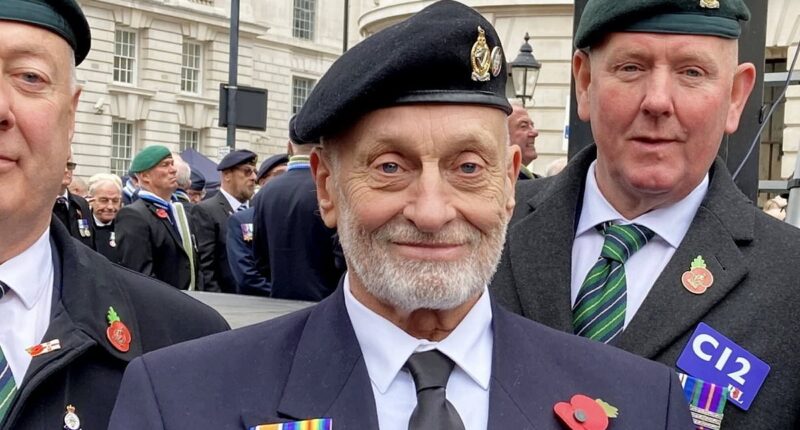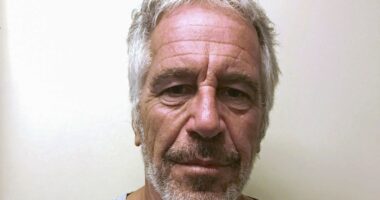A British Army veteran has been left stuck with a £20,000 NHS bill for the rest of his life after he had a heart attack in Africa.
73-year-old Steve Foreman was residing and working on an oil rig in Ogaden, Ethiopia when he suddenly collapsed, leading to his emergency evacuation to the closest hospital in Nairobi, Kenya.
At the age of 62, Foreman, a former soldier, fell into a 13-day coma and received extensive medical treatment, including being hooked up to a kidney dialysis machine, undergoing a tracheotomy, and receiving a blood transfusion to address his complete organ failure and multiple infections.
After three months of critical care in Nairobi, he was finally flown back to the UK and transferred to Worksop Hospital in Yorkshire.
His brother, Grant – whom he says asked the NHS to confirm he was eligible for free treatment – was tasked with caring for him.
After becoming stable, Mr Foreman was transferred to Doncaster Royal Infirmary for tracheotomy surgery.
But when he finally came out of the hospital around two months later he received a £20,000 bill from the NHS.
The elderly British national, who had spent the past two decades working in Africa and the Middle East following his military service in the British army, expressed surprise and dismay upon discovering that he would be required to cover the medical expenses.

Steve Foreman – at the Cenotaph, London. A British pensioner who had a heart attack in the desert is now stuck paying a £20k NHS bill for the rest of his life

Mr Foreman, from Stepney but now living in Croydon, south London, said: ‘We kicked up about this and got our local MP and the Veterans’ Foundation to help’
He was informed he was not entitled to services under the NHS or failed to provide evidence he was entitled – because he had been working outside the UK for more than two years.
Mr Foreman, from Stepney but now living in Croydon, south London, said: ‘We kicked up about this and got our local MP and the Veterans’ Foundation to help.
‘Our MP got onto the Department for Health and Social Security and they said I am an overseas visitor and have to pay.
‘I was on a walking frame as I had lost use of my muscles after all that time in hospital. I eventually got better but they put me into the hands of a debt collector. I said – “I’m not paying; that’s not our problem”.’
Mr Foreman was born in the UK, and worked until he was 19 at which point he joined the British Army.
Following this he worked on security contracts in Africa and the Middle East for security risk management companies and had been supplying security management risk on an oil rig in the desert when he was taken ill.
The father-of-two was flown back to the UK and had seven laser correction surgeries to attempt to fix the emergency tracheotomy he was given in Kenya which he says had gone wrong followed by rehabilitation.
But when he came out of hospital he was slapped with the bill.

Mr Foreman, 73, will now continue to pay £50 a month for the next 30 years of his life after his heart attack in Africa
Grant Foreman, 65, is adamant he was informed by NHS staff that if he had worked in the country for 10 years continuously and paid national insurance, he wouldn’t have to pay.
They have now been informed this is under the condition it was not more than two years ago – a rule Grant claims he was not told at the time.
Mr Foreman says after he was threatened with court action he was made to complete a financial statement self-assessment which worked out his income and outgoings and decided he could afford to pay £50 a month.
He did this for four years and paid around £1,800 before receiving a letter in 2019 telling him to put the money into a different account – and fearing it was a scam he stopped paying.
He returned to Africa where his daughter, now 17, and former wife were living and continued to work. He says he was chased by the debt collector but didn’t want to pay as he thought it was ‘morally wrong’.
But when he returned to the UK last year for his daughter’s studies and registered with a doctor’s surgery he was threatened with legal action by debt collectors unless he continued to pay.
Mr Foreman will now continue to pay £50 a month for the next 30 years.
He says he is on pension credit after being made homeless in May 2024 when he was evicted.
He now lives with his daughter – who is studying for her A-levels – in temporary housing provided by Lambeth Council and says he is ‘right on the breadline at the end of each month’.
‘Anytime I want to buy new clothes I have to think about this. I’m fed up paying it,’ he said.
‘I have spoken to a solicitor who said I shouldn’t be paying. I am an army veteran; I served my country twice in Northern Ireland and served in Berlin and yet there are people who get off the boats and get free NHS treatment.
‘I owe £18,000 to the NHS and I’m broke and 73 and will never work again. I just want them to drop the debt.
‘I have now contacted the collectors and I’m not paying anymore regardless of what they do to me. On humanitarian grounds the NHS should stop charging me.’
A spokesman for Doncaster and Bassetlaw Teaching Hospitals, said: ‘As an NHS organisation, we are legally required to follow national regulations and guidance when assessing whether a person is entitled to free healthcare.
‘These standards are set out in law and based on residency, not nationality.. As such, British citizens who live abroad may be charged for some services, depending on their individual circumstances and the type of care provided.
‘We are committed to applying these legal duties fairly and consistently, and to ensuring that all patients receive any urgent or immediately necessary treatment.’

















